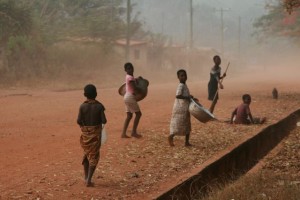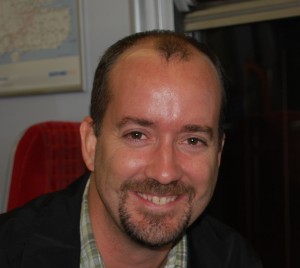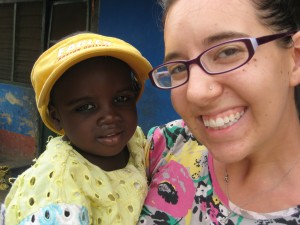Alumni share the life-changing effects of their service with U.S. Peace Corps
 In 1960, then-Sen. John F. Kennedy challenged students at the University of Michigan to serve their country in the cause of peace by living and working in developing countries. That challenge led to the foundation of the Peace Corps, an independent U.S. government agency that provides trained Volunteers for countries requesting assistance around the world.
In 1960, then-Sen. John F. Kennedy challenged students at the University of Michigan to serve their country in the cause of peace by living and working in developing countries. That challenge led to the foundation of the Peace Corps, an independent U.S. government agency that provides trained Volunteers for countries requesting assistance around the world.
Since then, a total of 43 Messiah College alumni have responded to that challenge by serving with the Peace Corps, and the numbers have only continued to grow in the last several years. In 2012, seven alumni were nominated—a notable increase from the three nominations in 2011.
These Messiah alumni have recounted very different journeys—each having arrived at the Peace Corps from an alternate route, having feared and anticipated various elements of their upcoming adventures, and having lived and served in a different location across the globe. But while each alumnus’ journey looks noticeably different, the effects of their experiences look remarkably similar: eye-opening, worldview-shaping and altogether life-changing.
Megan Wolf ’07: Thailand, ‘08-‘10
Megan Wolf ’07 traced the roots of her Peace Corps journey to her senior year of high school, where she heard a returned volunteer share her experiences from her Peace Corps service in the Central African Republic in the 1970s. “Her stories about waking up to find a black mambo snake in her bedroom and buying freshly pounded peanut butter in the local market stayed with me through my time at Messiah,” Wolf said.
These enthralling stories continuously beckoned Wolf to research the Peace Corps, and her findings promised much more than a thrilling adventure. She appreciated the Peace Corps’ service philosophy, which emphasizes the importance for volunteers to live like the people they work with and requires a two year commitment so that volunteers spend enough time in the community to become more than a visitor.
Wolf recalled an abundance of excitement throughout her service experience in a small fishing town in Southern Thailand where she served at an English teacher training program. “During training, I was excited to learn the language,” she said. “After moving to site, I was excited to spend time with my co-teachers, students and neighbors; to travel around the province, country and region; and to play with as many elephants as I could find.”
Wolf’s service experience proved to be everything she was excited for and more, and it left a lasting imprint on her life. “I see the effects of my time in Thailand in everything from the trivial (I still say ‘Oy!’ when I get hurt, like Thai people do, instead of saying ‘Oww!’), to the deepest core of who I am,” she said, explaining how her time in Thailand molded and shaped her faith.
Now, Wolf lives in Washington, DC, where she works for the Office of the U.S. Global AIDS Coordinator, which is the headquarters for the President’s Emergency Plan for AIDS Relief.
 Dan Breneman ’99: El Salvador ’02-‘06
Dan Breneman ’99: El Salvador ’02-‘06
For Dan Breneman ’99, interest in international service didn’t take shape until his time at Messiah. “I grew up in Argentina, and while at Messiah I felt a strong pull to go back to the area, though I couldn’t figure out the best way to do that,” said Breneman. During his senior year, Breneman embraced the opportunity to study abroad, and his trip to Barcelona, Spain ignited a personal passion for international travel.
At first, Breneman wanted to return to Eastern Europe, but during the Peace Corps interview process, he realized the benefit of serving in a country where he already spoke the language. Breneman accepted an invitation to serve in El Salvador where he worked to promote health and sanitation in a small mountainous community of 700 people.
Like Wolf, Breneman remembered his excitement before leaving—to experience a new culture, to create new friendships and to embrace unique, eye-opening experiences. However, he also recalled fearing the many changes to come. “I was afraid of many things about living ‘poor.’ At Messiah, just as at many colleges, we feel the pressure to start our careers by getting a good job. Peace Corps service meant living on a few dollars a day, suspending my college loan repayment, and delaying my career, or so it seemed at the time,” explained Breneman.
Thoughts of living in a small hut, bathing from a bucket, boiling drinking water and getting sick regularly scared Breneman into thinking he wouldn’t be able to make it for the full two year commitment. “In the end, the two years went by very quickly, and I enjoyed it so much I stayed in the country for another two years,” he said.
Some of his fears proved to be true; Breneman recalled difficult moments of sickness and loneliness. However, he also cited his service as the most influential experience of his life. “It completely changed my views on politics, religion, culture and career,” he said, explaining that his experience confirmed his career interest in international development.
After returning from El Salvador, Breneman studied international development at the University of Pittsburgh, spent a few years working in Washington, D.C. where he learned more about federal government funded development programs, and then transitioned to living and working in Africa. Now, Breneman manages a large U.S. government funded program to reduce malnutrition in 50 villages, with 120 staff and four offices.
“And yet the most significant and fulfilling phase of my career was the two-year Peace Corps volunteer experience spent learning and sharing in a small village in El Salvador,” said Breneman.
 Maria Karlya ’08: Ghana, ’08-‘10
Maria Karlya ’08: Ghana, ’08-‘10
Maria Karlya ’08 also recounted a Peace Corps journey that began at Messiah and required much perseverance through fear. While at Messiah, Karlya participated in the student Collaboratory, which set her up for constant dialogue with peers and professors about development and social justice. She also spent a semester in Uganda, an experience that heavily impacted the way she saw the world and influenced her life choices, including her decision to serve with the Peace Corps. “I think I ultimately wanted to put my money where my mouth was and spend some time in a very needy place,” Karlya said.
Karlya served in Ghana as a community health volunteer, promoting health and literacy in the rural village of Sankpala.
“I was afraid of absolutely everything,” Karlya remembered. “I was afraid of not being able to eat a cheeseburger on the reg, having to ride a bike, which I have not done since I was 10 years old. I was afraid that I would have very little access to internet, electricity, running water and all those comforts. I was afraid that I would be sick for two years straight. Most of all I was afraid I was going to be very isolated and very alone.”
But sure enough, Karlya’s experience proved to be life-changing beyond expression. “Every part of my life—my worldview, how I relate to people, how I relate to God, my purpose, my drive—has been transformed by living in rural Ghana. It turned me inside out,” Karlya said.
After Karlya returned, she led a team of writers to publish a travel and cultural guide to Ghana, which quickly rose to the top 10 on Amazon’s Coastal West Africa best-seller list. Now, Karlya is working in health communications at a health clinic that serves immigrant populations in New York City. “I am incredibly lucky, because I am both in public health and writing, two of my passions and skill sets that I didn’t know I could utilize at the same time and get paid for!” she said. “It’s funny that when you are passionate enough about things, jobs can come around and find you.”
Story by Mary-Grace MacNeil `13.




